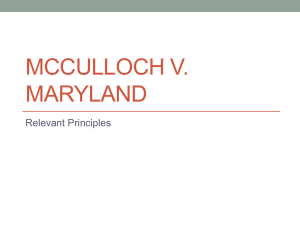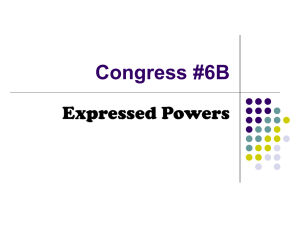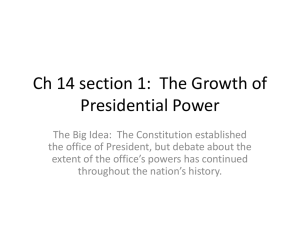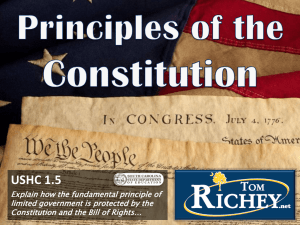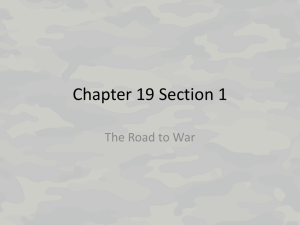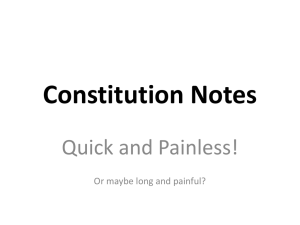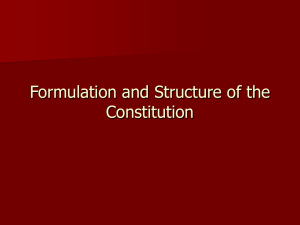Powers of Congress
advertisement
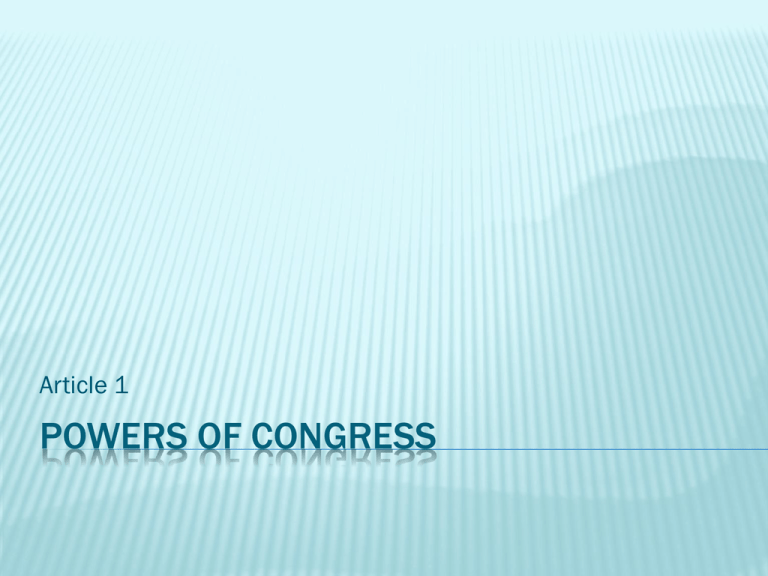
Article 1 POWERS OF CONGRESS WHY DO WE NEED A CONSTITUTION? To Limit the Power of Government. POWER OF CONGRESS The power of congress is also limited. The constitution places many restrictions on the congress. The powers of Congress are listed in ARTICLE 1 SECTION 8. The powers denied Congress are listed in ARTICLE 1 SECTION 9. ARTICLE 1 SECTION 8 “Enumerated or Expressed” Powers of Congress ARTICLE 1 SECTION 8 EXPRESSED POWERS Clause 1: The Congress shall have Power To lay and collect Taxes, Duties, Imposts and Excises, to pay the Debts and provide for the common Defense and general Welfare of the United States; but all Duties, Imposts and Excises shall be uniform throughout the United States; All money must be used for public use. Income Tax is the govt.’s largest revenue source. Direct Tax – levied against a person directly. Indirect Tax – not levied directly against a person (Ex: Tariff-a tax on imports – also considered a Protective Tax). Government Cannot Tax Exports. ARTICLE 1 SECTION 8 EXPRESSED POWERS Clause 2: To borrow Money on the credit of the United States; This is most often done through the sale of bonds. The constitution does not limit the amount the govt. may borrow, but a debt ceiling law passed by congress does. ARTICLE 1 SECTION 8 EXPRESSED POWERS Clause 3: To regulate Commerce with foreign Nations, and among the several states, and with the Indian Tribes Interstate: Between the states Intrastate: Within the States ARTICLE 1 SECTION 8 EXPRESSED POWERS Clause 4: To establish an uniform Rule of Naturalization, and uniform Laws on the subject of Bankruptcies throughout the United States; Bankruptcy – a proceeding in which a persons assets are distributed to whom a debt is owed. ARTICLE 1 SECTION 8 EXPRESSED POWERS Clause 5: To coin Money, regulate the Value thereof, and of foreign Coin, and fix the Standard of Weights and Measures; Examples: Time, Distance, Weight, Volume, Area ARTICLE 1 SECTION 8 EXPRESSED POWERS Clause 6: To provide for the Punishment of counterfeiting the Securities and current coins, paper money, bonds, ect… of the United States; Counterfeit: to Falsify Currency ARTICLE 1 SECTION 8 EXPRESSED POWERS Clause 7: To establish Post Offices and post Roads; Example: Rural Routes It is a “FEDERAL” Crime to tamper with the mail. ARTICLE 1 SECTION 8 EXPRESSED POWERS Clause 8: To promote the Progress of Science and useful Arts, by securing for limited Times to Authors and Inventors the exclusive Right to their respective Writings and Discoveries; Copyrights: Exclusive Right to control the reproduction , publication, or sale of Literary, Musical or other creative works. Life + 50 Years Patents: Exclusive Right to control the manufacture or sale of a person’s inventions. 17 years ARTICLE 1 SECTION 8 EXPRESSED POWERS Clause 9: To constitute Tribunals inferior to the supreme Court; Gives congress the power to set up lower Federal Courts beneath the Supreme Court ARTICLE 1 SECTION 8 EXPRESSED POWERS Clause 10: To define and punish Piracies and Felonies committed on the high Seas, and Offences against the Law of Nations; This applies to areas outside the international 12 mile limit and the 200 mile U.S. claims. ARTICLE 1 SECTION 8 EXPRESSED POWERS Clause 11: To declare War, grant Letters of Marque and Reprisal, and make Rules concerning Captures on Land and Water; Only congress can declare war, but the President can make war without a formal declaration, but only for a specified amount of time (War Powers Resolution of 1973). ARTICLE 1 SECTION 8 EXPRESSED POWERS Clause 12: To raise and support Armies, but no Appropriation of Money to that Use shall be for a longer Term than two Years; An example of an implied power of this clause is the DRAFT ARTICLE 1 SECTION 8 EXPRESSED POWERS Clause 13: To provide and maintain a Navy ARTICLE 1 SECTION 8 EXPRESSED POWERS Clause 14: To make Rules for the Government and Regulation of the land and naval Forces; (Military Justice ie: Court Marshals) ARTICLE 1 SECTION 8 EXPRESSED POWERS Clause 15: To provide for calling forth the Militia to execute the Laws of the Union, suppress Insurrections and repel Invasions; ARTICLE 1 SECTION 8 EXPRESSED POWERS Clause 16: To provide for organizing, arming, and disciplining, the Militia, and for governing such Part of them as may be employed in the Service of the United States, reserving to the States respectively, the Appointment of the Officers, and the Authority of training the Militia according to the discipline prescribed by Congress; Allows the states to have a local militia (National Guard) and to appoint state militia officers, but congress reserves the right to call these units into Federal Service ARTICLE 1 SECTION 8 EXPRESSED POWERS Clause 17: To exercise exclusive Legislation in all Cases whatsoever, over such District (not exceeding ten Miles square) as may, by Cession of particular States, and the Acceptance of Congress, become the Seat of the Government of the United States, and to exercise like Authority over all Places purchased by the Consent of the Legislature of the State in which the Same shall be, for the Erection of Forts (Military Bases), Magazines, Arsenals (Weapon Storage), Dock-Yards (Military Ports), and other needful Buildings; —And Clause 18 : To make all Laws which shall be necessary and proper for carrying into Execution the foregoing Powers, and all other Powers vested by this Constitution in the Government of the United States, or in any Department or Officer thereof. Also known as the “ELASTIC CLAUSE” Gives congress the power to make all laws that are “Necessary and Proper.” (Ex: Speed Limits) 2 CATEGORIES OF POWER BELONGING TO CONGRESS Legislative – Constitutional powers that form the base on which Congress can and does make law. Non-Legislative – Powers through which Congress can and does carry out other functions closely related to it authority to make law. (ex: Impeachment, Censure, Oversight Function, Electoral Duties, Amendments.) POWERS OF CONGRESS The powers given Congress whether Legislative or Non-Legislative can be divided in 3 Different types that define where these powers come from. 1. Expressed: (Sometimes called enumerated) Powers that are expressly written in the constitution. 2. Implied: Powers that are implied from expressed powers. 3. Inherent: Powers of the National Govt. that belong to it because it is the nation govt. Ex: Acquire territory, protect against invasion, etc… POWER STRUGGLE Federalist/Anti-Federalist argued over the adoption of the constitution. Strict Constructionalist – (Jefferson) believed that govt. had only those powers given to it by the constitution. (Democratic-Republican Party) Liberal Constructionalist – (Hamilton) believed that the Congress had more powers than what were written in the constitution. (Federalist Party) POWER STRUGGLE The Liberal Constructionalist eventually won this argument after several important Supreme Court Cases. Some even over expressed powers. Gibbons vs. Ogden – Upheld the Congress’s Right to regulate interstate commerce. Hepburn vs. Griswald – S.C. stated that the federal govt. did not have the right to print paper money. Legal Tender Cases – Juliard vs. Greenman – in these cases the S.C. reversed its decision in Hepburn vs. Griswald and upheld the issuing of paper money. POWER STRUGGLE Arguments over Implied Powers McCulloch vs. Maryland – The supreme court upheld the concept of Implied Powers (that there were more powers than what are expressly written in the constitution. ARTICLE 1 SECTION 8 CLAUSE 18 The necessary and proper clause. Also known as the elastic clause because it increases the power of the federal govt. 5 THINGS THAT CONTRIBUTED TO THE GROWTH OF NATIONAL POWER Wars Economic Crises National Emergencies Advances in Technology Peoples Demand for Services

